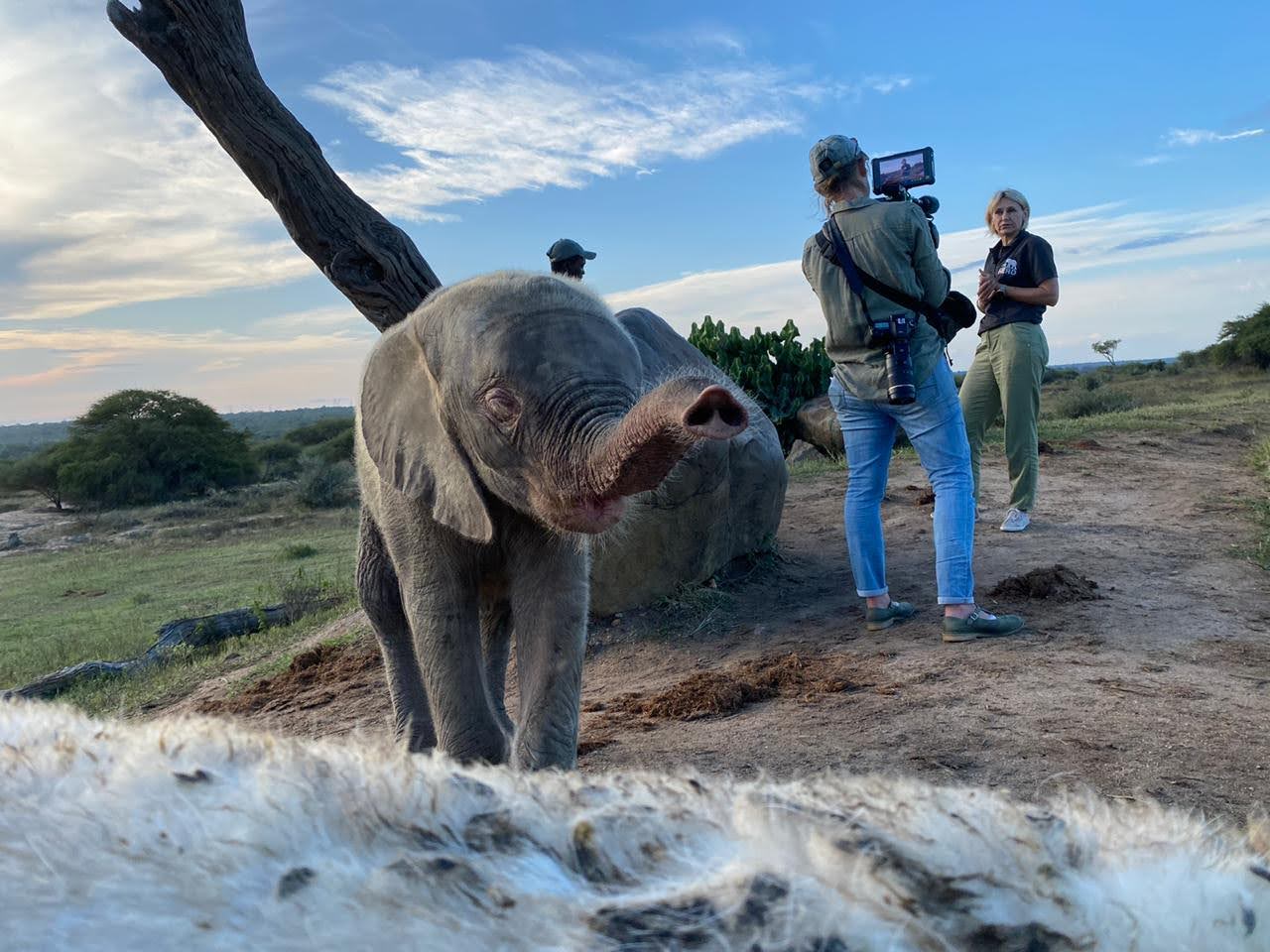Orphaned Albino Elephant Calf Khanyisa’s successful six-month journey of rehabilitation at HERD.
It has been an incredible six months of rehabilitation and phased integration into the Jabulani herd for little albino elephant calf, Khanyisa at HERD (Hoedspruit Elephant Rehabilitation and Development), South Africa’s first dedicated elephant orphanage.
Watch the Journey So Far Here
Khanyisa was rescued on 7 January 2020, having survived several days on her own in the wild, severely injured from a snare that had wrapped itself around her head, severing the top lobe of her left ear and causing severe lacerations around her head, neck, mouth and cheeks. The four-month-old calf somehow freed the snare from the ground, but it remained wrapped around her, continually rubbing and cutting into her flesh.
It is unclear if her herd had abandoned the albino calf before she was ensnared or after the incident. The fact that she survived so long in the wild is a miracle; she was dehydrated, and her eyes had swollen shut from pressure building from the snare and the swelling around her head. The trauma she experienced, although not visually evident, will no doubt cut much deeper than the physical pain she endured.
The calf was discovered in a nature reserve neighbouring the south-west of the Kruger National Park by two employees of the Mpumalanga Tourism and Parks Agency (MTPA). She was taken to the Care for Wild Rhino Sanctuary in Mpumalanga to be stabilised, while the inter-provincial permit was arranged to translocate her to the province of Limpopo, where HERD is situated. The same day, our elephant care team departed from HERD to join the Care for Wild team to provide essential milk and care for the calf overnight.
The first 24 – 48 hours are the most crucial in caring for a distressed elephant calf. It is essential that they are provided with the correct milk formula for their complex needs and provided with a lot of love and emotional support.
On 8 January, the little calf arrived at HERD, to start her long road of rehabilitation ahead of meeting her new family-in-waiting, the Jabulani Herd.
It is with immense pride, six months later, on 8 July, that we can relate her story of survival and development. The Jabulani herd of rescued elephants, all mostly orphans themselves, have taken in and adopted orphans before with great success. Khanyisa’s journey began right beside the Herd in our orphanage nursery, with dedicated carers and her companion sheep, Lammie, by her side, giving round-the-clock care, support and attention.
It is a tragic event when an elephant calf is separated from its family, but it is for this very reason that Adine Roode founded HERD in 2019. To give orphaned elephant calves a second chance at a herd of their own and provide rehabilitation close to the vital emotional support of adult and sub-adult elephants. Adine had seen the rise in displaced and abandoned calves through increased poaching and human-elephant conflict and felt that the unique set-up of the Jabulani herd provided an ideal solution for orphans in need.
TREATMENT OF HER WOUNDS
The most significant part of her rehabilitation process was the long yet successful treatment of her wounds. The open flesh of her deep mouth wounds from the snare had maggots feeding off the decaying flesh. The maggots created gaping holes into her mouth. First, we had to treat the calf’s wounds to combat infection and keep them clean. Once satisfied that all possible infection had cleared, Wildlife Vet, Dr. Peter Rogers began with the stitching of her wounds.
On 16 January, Dr Rogers stitched up the cheek and mouth wounds. At the end of January, he stitched the back of her right ear.
Adine started with stemcell treatment on Khanyisa’s wounds in March, to assist in the final stage of healing. The skin-restoring serum combines plant-derived stem cells cultivated from Argan tree and Comfrey roots and helped to regenerate the dry and damaged skin, with a natural extract from the aerial part of Onopordum Acanthium, to increase skin turnover. The treatment was successful; her wounds had healed entirely by the end of March.
CHALLENGES
During these milestones, Khanyisa suffered occasional bouts of diarrhoea, which is always disconcerting with elephant calves. Diarrhoea can be brought upon from PTSD, bacteria, teething or dietary challenges as their nutritional needs consistently change as a calf grows. But the HERD team, working continuously throughout the COVID-19 Lockdown, saw to every hurdle with efficient care and managed to help the calf through these bouts, with the assistance of Dr Rogers and trusted elephant advisors.
KHANYISA’S GRADUAL INTEGRATION INTO THE JABULANI HERD
Lundi, already a mother and an older female in the Jabulani herd, was chosen to be Khanyisa’s adoptive mother and was introduced to Khanyisa next.
Lundi was the ideal choice of mother for Adine, since the herd Matriarch, Tokwe, already had her time filled caring for her own two children and two younger orphans. Lundi and Khanyisa took to one another beautifully, with Khanyisa instinctively trying to suckle her.
Over the weeks, the other elephants in the Herd were introduced step by step – and at a gradual pace to not overwhelm Khanyisa or the Herd and to better monitor each of their reactions and stress levels, which we track through sampling their dung daily.
Besides Lundi, many other elephants in the Jabulani Herd have stepped up to help protect and care for Khanyisa, namely as allomothers, such as Bubi, who has shown extraordinary motherliness, Tokwe, Kumbura (an orphan accepted by the herd in 2009), Limpopo and Klaserie.
As of this week, she is now spending longer days – stretching from 6AM to 2PM – in the wild with the elephants, and joining them for their afternoon swims too.
It has been the constant, speedy and dedicated and vital care of the HERD team and their vets and experts that has gotten Khanyisa through the last six months of rehabilitation and integration, supported by essential funding from donors and foster parents.
But Khanyisa has shown a will to survive, with a constant fighting and courageous spirit, no doubt encouraged by the love and nurturing of the carers and elephants she has come to know as her family. She inspires us and her followers around the world every day.
Please follow our active social media platforms for daily updates on Khanyisa:
YOUTUBE – FACEBOOK – INSTAGRAM
HERD relies on funding to cover our operational costs as well as the high costs of Khanyisa’s care. If you would like to contribute, please consider donating to HERD or fostering Khanyisa, click here:




 Comment
Comment







Elephants are so cool.